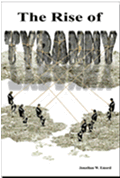THOUGHTS
ON PART NINE OF “A CONCURRING OPINION”
PART 9
By
Dr. Edwin Vieira, Jr., Ph.D., J.D.
April 8, 2010
NewsWithViews.com
Timothy Baldwin’s “A CONCURRING OPINION FOR SECESSION (Part 9)” continues his argument, with the main point of which I remain in full accord, that the Supreme Court of the United States is not the sole and final judge of the constitutionality of a State’s resistance to usurpation and tyranny on the part of rogue public officials in the General Government. Nonetheless, again Mr. Baldwin makes some assertions that deserve special consideration.
1. In support of a State’s right to “secede”, Mr. Baldwin asks
[b]y what means can the states guard against the federal government where the only method of guarding is through amending the constitution, despite the fact that the constitution’s meaning and intent is not defective. Is the constitution to be amended upon each and every federal encroachment?
One might ask in reply, are then States to “secede” “upon each and every federal encroachment”? Are the champions of liberty to run away from their own government—for, as Mr. Baldwin contends, the General Government is nothing but the creation of the States, through their “compact”—at the first sign of serious trouble? Is “secession” the only remedy for such abuses? If so, why? Is it the preferred remedy? If so, why? What about “interposition” by the States, which if successful would maintain the Union intact? What about, in the present situation of a collapsing Federal Reserve System, the introduction by the States of an alternative economically sound and constitutional currency in their own economies? That would not involve “secession”, either. What about revitalization of “the Militia of the several States”, State by State? That would surely have a greater deterrent effect upon rogue public officials in the Disgrace of Columbia than empty threats of “secession”. Questions of this type must be answered before one can conclude that present circumstances leave patriotic Americans with no alternative except to open Pandora’s Box in order to watch “secession”—and Heaven knows what else as a consequence of “secession”—jump out.
2.
The burden of most of Mr. Baldwin’s argument in Part 9, of his
series is that individual States must have some ultimate right
of self-defense and self-preservation, including “secession”,
if the General Government—and, presumably, three-fourths of the
States that were to side with it in its oppression of the remaining
one-fourth—become truly tyrannical and utterly uncontrollable.
With that one must agree; for such is the doctrine of the Declaration
of Independence, upon the principles of which all subsequent constitutions
and laws America depend Before that doctrine can be applied, however,
the States seeking to invoke it must “let Facts be submitted to
a candid world” to the effect that they have taken every other
legal step within their power to avoid having to “abolish the
forms [of government] to which they are accustomed”, “to
throw off such Government, and to provide new Guards for their future
security”. Mr. Baldwin’s argument is devoid of any list
of such steps that should be taken, or that could be taken, let alone
that have been taken. Instead, he jumps directly from the frying pan
of “federal encroachments” into the fire of “secession”,
as if no possible alternatives were even imaginable, let alone possibly
viable. In matters as serious as these, though, one must temper enthusiasm
with circumspection.
Mr. Baldwin may be on slippery ground when he advocates “resistance”
through “secession” by States that, up to now, have shown
no proclivity to stand up against “federal encroachments”
in any significant way. Oh, I know about some States’ opposition
to the proposed National ID Card or to National Health Care, and various
States’ “Tenth Amendment Resolutions” that assert
the principle of “State sovereignty”. These, however, are
little more than toothless paper tigers. For the two dire, unavoidable
threats confronting this country are (i) an economic catastrophe stemming
from the imminent collapse of the Federal Reserve System, and (ii) the
imposition of a national para-military police state to stem
the massive social unrest that will arise out of that catastrophe. But,
to my knowledge, no State has even outlined a plan for “resistance”,
involving “secession” or anything else, that meets these
dangers head-on.
I am sure that Mr. Baldwin will agree with me that all too many advocates of “secession” fail to recognize that talk is cheap but action costly—that “secession” could never succeed, and no circumspect individuals would ever risk participating in it, unless, in addition to working out a detailed plan, the “seceding” State had already prepared herself in numerous practical ways for the intense political and economic conflict her “secession” would cause. (Not that there would have to be an absolute certainty of success, but at least there could not be a certainty of failure.)
| Subscribe to the NewsWithViews Daily News Alerts! |
So, on practical grounds, I must disagree with Mr. Baldwin when he argues that “where the US S CT conspires (in principle and effect) with Congress and the President to deny the people of the states their rights and sovereignty, the states are not bound to suffer at the hands of a union that is enslaving them”. If “the people of the states” do not adequately plan and prepare themselves to resist such oppression by all lawful means, they will have no choice but to suffer. And much of this planning and preparation will have to occur before “secession” could ever take place. For part nine click below.
Click here for part -----> 1, 2, 3, 4, 5, 6, 7, 8, 9, 10, 11, 12,
















